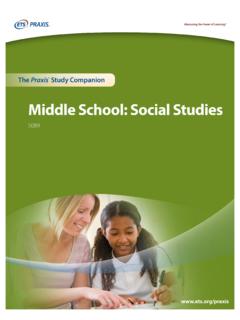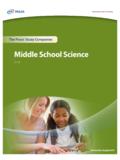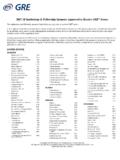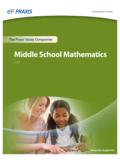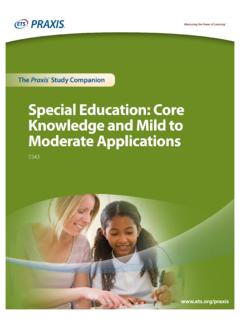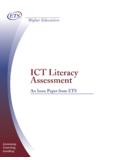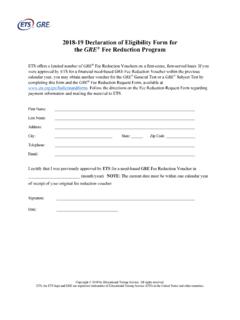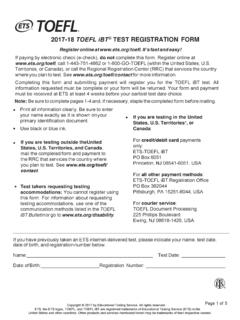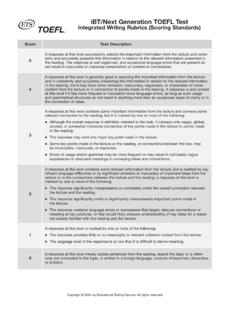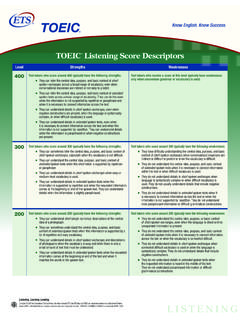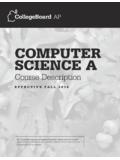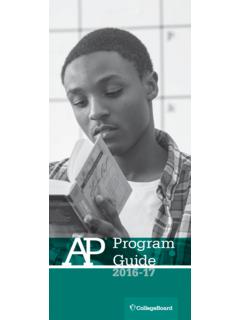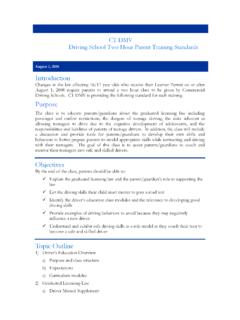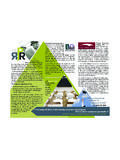Transcription of Physical Education: Content Knowledge - ETS Home
1 Physical education : Content Knowledge Praxis Study CompanionThe Praxis Study Companion2 Welcome to the Praxis Study CompanionWelcome to The Praxis Study Companion Prepare to Show What You KnowYou have been working to acquire the Knowledge and skills you need for your teaching career. Now you are ready to demonstrate your abilities by taking a Praxis test. Using the Praxis Study Companion is a smart way to prepare for the test so you can do your best on test day. This guide can help keep you on track and make the most efficient use of your study Study Companion contains practical information and helpful tools, including: An overview of the Praxis tests Specific information on the Praxis test you are taking A template study plan Study topics Practice questions and explanations of correct answers Test-taking tips and strategies Frequently asked questions Links to more detailed informationSo where should you start?
2 Begin by reviewing this guide in its entirety and note those sections that you need to revisit. Then you can create your own personalized study plan and schedule based on your individual needs and how much time you have before test in mind that study habits are individual. There are many different ways to successfully prepare for your test. Some people study better on their own, while others prefer a group dynamic. You may have more energy early in the day, but another test taker may concentrate better in the evening. So use this guide to develop the approach that works best for teaching career begins with preparation. Good luck!Know What to ExpectWhich tests should I take?
3 Each state or agency that uses the Praxis tests sets its own requirements for which test or tests you must take for the teaching area you wish to you register for a test, confirm your state or agency s testing requirements at are the Praxis tests given?Praxis tests are given on computer . Other formats are available for test takers approved for accommodations (see page 36).The Praxis Study Companion3 Welcome to the Praxis Study CompanionWhat should I expect when taking the test on computer ?When taking the test on computer , you can expect to be asked to provide proper identification at the test center. Once admitted, you will be given the opportunity to learn how the computer interface works (how to answer questions, how to skip questions, how to go back to questions you skipped, etc.)
4 Before the testing time begins. Watch the What to Expect on Test Day video to see what the experience is and when are the Praxis tests offered?You can select the test center that is most convenient for you. The Praxis tests are administered through an international network of test centers, which includes Prometric Testing Centers, some universities, and other locations throughout the schedules may differ, so see the Praxis web site for more detailed test registration information at The Praxis Study Companion4 Table of ContentsTable of ContentsThe Praxis Study Companion guides you through the steps to success1. Learn About Your Test ..5 Learn about the specific test you will be taking2.
5 Familiarize Yourself with Test Questions ..9 Become comfortable with the types of questions you ll find on the Praxis tests3. Practice with Sample Test Questions ..13 Answer practice questions and find explanations for correct answers4. Determine Your Strategy for Success ..20 Set clear goals and deadlines so your test preparation is focused and efficient5. Develop Your Study Plan ..23 Develop a personalized study plan and schedule6. Review Study Topics ..27 Detailed study topics with questions for discussion7. Review Smart Tips for Success ..34 Follow test-taking tips developed by experts8. Check on Testing Accommodations ..36 See if you qualify for accommodations that may make it easier to take the Praxis test9.
6 Do Your Best on Test Day ..37 Get ready for test day so you will be calm and confident10. Understand Your Scores ..39 Understand how tests are scored and how to interpret your test scoresAppendix: Other Questions You May Have ..41 The Praxis Study Companion5 Step 1: Learn About Your Test1. Learn About Your TestLearn about the specific test you will be takingPhysical education : Content Knowledge (5091)Test at a GlanceTest Name Physical education : Content KnowledgeTest Code 5091 Time 2 hoursNumber of Questions 120 Format Selected-response questionsTest Delivery computer delivered Approximate Approximate Content Categories Number of Percentage of Questions Examination I.
7 Content Knowledge and Student Growth 36 30% and Development II. Management, Motivation, and 30 25% Communication III. Planning, Instruction, and Student 30 25% Assessment IV. Collaboration, Reflection, and Technology 24 20%IVIIIIIIA bout This TestThe Content Knowledge test in Physical education is designed to measure the professional Knowledge of prospective teachers of Physical education in elementary through senior high schools. Examinees typically have completed, or are about to complete, a bachelor s degree program in Physical education , exercise science, or similar program of study. The test assesses whether an examinee has the Knowledge and competencies necessary for a beginning teacher of Physical education .
8 The Content of the test is based largely on the teacher preparation standards created by the Society of Health and Physical Educators (SHAPE America), formerly the American Alliance of Health, Physical education , Recreation and Dance (AAHPERD).The 120 selected-response questions cover Knowledge of fitness, kinesiology, exercise physiology, fundamental movements, and sports that comprise the Content of Physical education classes; Knowledge of areas in the natural and social sciences that provide the foundation for teaching these activities; and Knowledge of crucial topics in health and safety. Knowledge of these subject areas enables teachers to understand the nature and purpose of the activities in the Physical education curriculum, to evaluate and interpret the Physical characteristics and performances of students in Physical education classes, and to make decisions about the ongoing conduct of Physical education classes and the needs of students in those classes.
9 Questions will test Knowledge of essential facts, including the meaning of terms and placement of Content elements in proper categories, understanding of relationships between and among areas of Content , and the ability to apply concepts appropriately. This test may contain some questions that will not count toward your Praxis Study Companion6 Step 1: Learn About Your TestI. Content Knowledge and Student Growth and DevelopmentA. Core Concepts1. Terminology, principles, concepts, and applications of the basic sciences as related to motor skills and movement activities ( , anatomy and physiology, exercise physiology, biomechanics and kinesiology, motor development and motor learning)2.
10 Principles of biomechanics and kinesiology as they relate to motor skills and movement patterns ( , summation of forces, center of gravity, force/speed relations, torque)3. Movement concepts ( , body awareness, spatial awareness, effort, relationship)4. Exercise physiology ( , components of health-related fitness; components of skill-related fitness; fitness guidelines, such as frequency, intensity, time/duration, type/mode; principles of exercise, such as specificity, overload, progression; roles of body systems in exercise; short- and long-term effects of Physical training; nutrition as related to exercise; fitness; metabolic response to exercise)5. Anatomy and physiology ( , skeletal, muscular, nervous, circulatory, and respiratory systems)6.
